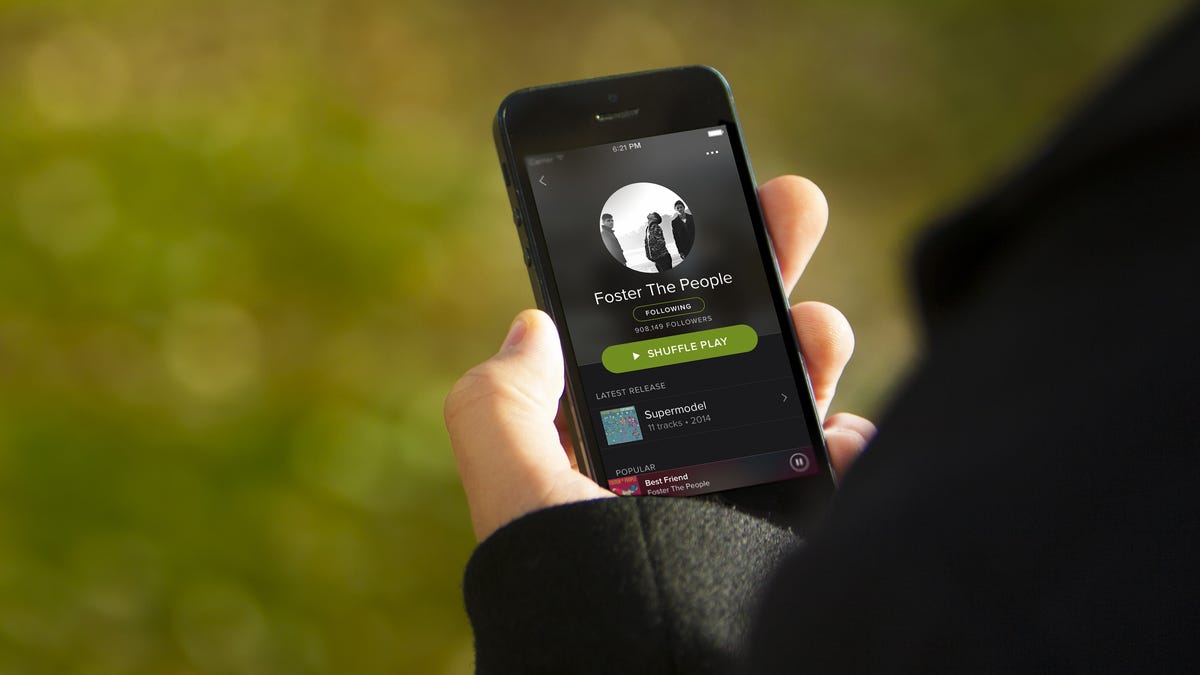According to recent subscriber numbers, Apple isn't keeping up with the rapid advancement of both music services.
While Apple aims to impress listeners with the advancements of its music service, Spotify might be more deserving of your delayed applause.
Based in Cupertino, California During the Wednesday launch event for the iPhone 7, Apple touted that since its June 2015 introduction, its subscription-streaming service, Apple Music, has amassed 17 million paying customers. Two million more were added in less than three months.
Though it's a cheery rise, a quick calculation shows that Apple and Spotify are adding users at roughly the same pace. And Spotify is surpassing Apple in terms of sheer volume because of its substantial lead.
The numbers support the idea that more people are choosing to stream music in an all-you-can-eat fashion rather than purchasing tracks individually. That's in part because of the extensive marketing that Apple invested in own subscription music service. The numbers also offer new perspective on a horse race between two companies that's grown bitter this year.
Both Spotify and Apple provided a picture of how much each service grew at about the same time period when they announced their member counts nearly five months prior, and they both updated their membership figures in the previous two weeks.
In the five months from late March to late August, Spotify added 9 million users, bringing its total membership to over 39 million. In the four and a half months since late April, Apple Music has added 4 million subscribers, bringing its total number to 17 million.
This indicates that at essentially the same period of time, both Apple and Spotify saw a roughly 30% increase in membership. However, the actual number of signups was more than twice as high as the number of new users joining Apple's service, primarily because Spotify already had a far larger subscriber base. Apple needs to start growing quicker than its competitor if it hopes to bridge the gap and surpass Spotify.
More from Apple's event
"Spotify is actually winning right now," stated Russ Crupnick, managing partner and analyst at MusicWatch. Crupnick's study indicates that Spotify has the largest number of paid listeners overall, the strongest net additions, and users who typically spend more time on the site than Apple Music customers do on Apple's service.
Sweden-based Considering Apple Music's tardy debut into the market a year ago, Spotify launched over eight years ago. Early issues with Apple Music's release included glitches that completely destroyed some users' iTunes libraries.
Another big benefit of Spotify is that it's the only service that allows free on-demand music streaming with advertising. As a result, rival services such as Apple Music and Tidal rely on exclusive releases. For example, Tidal is unique to Beyoncé's album "Lemonade," while Apple Music is exclusive to Frank Ocean's album "Blonde." This has given rise to rumors that Spotify is taking revenge on musicians who give exclusives to other platforms.
Streamers are competing more fiercely this year because the recording industry insisted that most subscription services charge the same fee for identical catalogs of millions of songs. One of the main ways the services are differentiating themselves from the competition is through exclusives.
But the streaming-music market still has "much more field to plow," Crupnick said. "It's way too early to pick a winner."
In conclusion, the competition between Apple Music and Spotify remains fierce, with each service offering unique strengths that cater to different user preferences. Spotify continues to lead with its extensive library, advanced algorithm-driven playlists, and a robust free tier that attracts a broad audience. On the other hand, Apple Music distinguishes itself with superior sound quality, seamless integration within the Apple ecosystem, and exclusive content that appeals to dedicated music enthusiasts.
While Spotify boasts a larger global user base and a strong presence in music discovery, Apple Music's focus on high-quality audio and exclusive releases provides a compelling alternative. The market leadership in 2024 is not solely defined by subscriber numbers but also by user satisfaction, innovation, and the ability to adapt to evolving trends.
Ultimately, the choice between Apple Music and Spotify depends on individual priorities—whether it's the breadth of content, audio quality, or ecosystem compatibility. Both platforms continue to innovate and expand, ensuring that the music streaming landscape remains dynamic and competitive. As we look ahead, the ongoing rivalry between Apple Music and Spotify promises to drive further advancements, benefiting music lovers worldwide.
